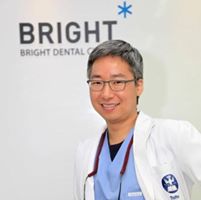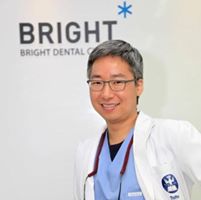DENTAL IN SOUTH KOREA
Dental health in South Korea is part of our overall health. As a rule, both genes and our lifestyle have a greater or lesser influence on our health. Teeth, like other physical traits such as eye color or build, are subject to the rules of heredity.
Environmental influences, life routines, habits, and heredity can therefore play a role in the emergence and development of diseases in South Korea.
How does this relate to our teeth? Are bad teeth hereditary? When does adhering or not adhering to and maintaining or not maintaining oral hygiene predominate, and when is it a hereditary predisposition?
LIFESTYLE HABITS ARE ALSO “INHERITED” IN SOUTH KOREA
Dental health in South Korea doesn't always inherit only biological conditions. To a certain extent, lifestyle habits are also “passed on” or taken over by family members. Much of our learning process happens through imitation or observation.
So it is not surprising that we consciously and unconsciously adopt habits that affect dental health. Bad habits can easily creep in, especially when it comes to dental hygiene. For example, if daily brushing of teeth is not part of the daily routine or if a particularly large amount of sugar is consumed, this can have a lasting negative impact on oral health.
TOOTH POSITION AND CROOKED TEETH – COINCIDENCE IN SOUTH KOREA?
If you look at the tooth positions in South Korea, jaws and teeth are formed is actually genetic. It is also genetically determined how much space each tooth has, how big the tooth is and whether the wisdom teeth will develop. Which teeth develop when is also hereditary?
Misaligned teeth in South Korea are basically due to the genes, over which we, unfortunately, have no influence. Even the size and shape of the jaw, the position and structure of the teeth, and the thickness of the enamel are things we inherit in South Korea.
And therein lies the first risk for dental health: South Korean researchers have established that there is an individual gene variation that can fight germs. This means that dental diseases cannot be inherited per se, but that our body has hereditary defense mechanisms of different strengths.
GENETIC CARIES IN SOUTH KOREA
When is tooth decay genetic in South Korea? Tooth decay is an infectious disease caused by certain bacteria that convert sugars into harmful acids. The acids damage the tooth enamel and eat holes in the tooth. Therefore, it is important to limit sugar consumption and brush your teeth twice a day.
It is also advisable to use dental floss. Unfortunately, despite observing these rules, sometimes the drill still has to be used. This is because not all tooth enamel has the same ability to fight tooth decay pathogens: the hardness and composition of tooth enamel vary depending on how we are genetically equipped. The softer tooth enamel makes it easy for bacteria.
But: The germs themselves and not the genetic condition trigger the tooth decay. This also means that as a precaution it is always important to practice thorough oral hygiene. The higher the hereditary risk of suffering from caries, the more important it is to observe certain dental hygiene measures. Tooth decay is genetic but is caused by bacteria.
IS PERIODONTAL DISEASE HEREDITARY IN SOUTH KOREA?
Similar to caries, periodontosis (medical periodontitis) is also triggered by bacteria in South Korea. However, it is not the teeth that are affected, but the gums, the tooth-retaining fibers, and, in an advanced stage, the jawbone.
It has been proven dental In South Korea that certain gene variations influence the frequency and course of periodontitis. Periodontitis is therefore partially hereditary: a gene complex responsible for the formation of so-called “interleukins” (transmitter substances involved in the immune system) is crucial.
In about a third of the South Korean population, the immune system reacts to bacterial infection by producing particularly large amounts of interleukins. Basically, this is a sensible defense reaction against pathogens. However, if there is an overproduction, this causes problems: The result is an increased inflammatory reaction that leads to the destruction of the body's own tissue.
Anyone who carries this genetic predisposition in South Korea has a higher risk of developing periodontitis and of developing it more quickly and severely.
With the help of an interleukin genetic test, you can determine whether you belong to a genetic risk group and whether your periodontal disease is hereditary. Early detection and rapid treatment are essential here.
ARE YELLOW TEETH HEREDITARY IN SOUTH KOREA?
The color of the teeth in South Korea is also a combination of genes and environmental influences. Our healthy tooth enamel is usually thick and white. Below that is the dentin inside the tooth.
Dentin is yellow and becomes more apparent as the overlying enamel thins. On the one hand, this can happen in old age due to wear and tear of the tooth enamel, on the other hand, it can be genetically determined in young adulthood when teeth are formed with only very thin tooth enamel.
Something that you have control over is smoking and coffee consumption. Both will stain your teeth. You can keep them white longer if you do without them.
ACT PROACTIVELY IN SOUTH KOREA
True hereditary diseases, which inevitably lead to tooth damage, are fortunately rare. If dental disease in South Korea has accumulated in your family over several generations, it may make sense to contact a dentist who specializes in genetics. Research continues and genes are discovered that may be responsible for specific dental problems.
BAD TEETH ARE HEREDITARY IN SOUTH KOREA
We hope we were able to answer the question of whether bad teeth are hereditary. The decisive factor for dental in South Korea is always the interaction between hereditary factors and lifestyle habits such as diet and oral hygiene.
WHAT COSTS DOES HEALTH INSURANCE COVER IN SOUTH KOREA?
For children and young people between the ages of 6 and 17, statutory health insurance covers the costs of sealing the back molars. This is where the grooves and furrows are most pronounced.
For adults, the costs are not covered by statutory health insurance in South Korea. However, private funds could cover the costs. Supplementary dental insurance can also cover the benefit. It is best to clarify this directly with your contact person.
COST OF DENTAL IN SOUTH KOREA
Dental Implant for a Single Tooth will cost you around $1,160 in South Korea.














